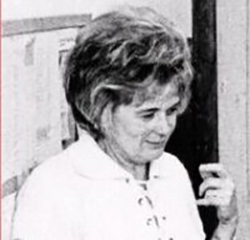Humanist Women in History: Lisa Kalvelage
March is Women’s History Month in the United States, the UK, and Australia. In commemoration we bring you the fourth of our five-part Humanist Women in History series. The first installment profiled Shirley Chisholm, the second Frances Fox Piven, and the third was about Priscilla Robertson.
“I don’t believe there is a god we can turn to in the time of need. As a humanist I must do everything in my power to become involved in the issues of our time. If we have this conviction, we also will have the strength to make a difference.”
 Lieselotte “Lisa” Kalvelage was born on April 21, 1923, in Nuremberg, Germany. Kalvelage described her father as a “raging atheist who was extremely and verbally angry with organized religion” and her mother as a “lukewarm Lutheran” who insisted that Lisa and her sister attend Sunday school. As a teenager during World War II she lived through years of aerial bombings, in her own words, “always ready to jump out and grab a satchel with important papers and go down into the basement, hoping our city wouldn’t be the one with its name on the bombs.”
Lieselotte “Lisa” Kalvelage was born on April 21, 1923, in Nuremberg, Germany. Kalvelage described her father as a “raging atheist who was extremely and verbally angry with organized religion” and her mother as a “lukewarm Lutheran” who insisted that Lisa and her sister attend Sunday school. As a teenager during World War II she lived through years of aerial bombings, in her own words, “always ready to jump out and grab a satchel with important papers and go down into the basement, hoping our city wouldn’t be the one with its name on the bombs.”
“In 1947 the Americans claimed every German was guilty,” Kalvelage recalls, “and I took it to my heart.” When she immigrated to the United States in 1948 to marry Bernard Kalvelage, a member of the US Air Force whom she’d met after the war ended, she was determined to bring greater understanding of the horrors of war to everyone who asked questions or was willing to listen.
Kalvelage and her husband moved to San Jose, California. As their five daughters became of school age, their friends went to Sunday school and invited them to come along. Kalvelage and her husband didn’t want to expose their children to the same indoctrination imposed upon them as kids, and so they joined the Unitarian Church.
With the Vietnam War raging and number of casualties rising daily, Kalvelage also joined the San Jose Peace Center. On May 25, 1966, acting on a tip from a journalist friend, Kalvelage and three other women staged a protest at a storage yard in Alviso, California. Carrying picket signs and dressed conservatively with hats and gloves to counter the stereotype that all peace activists were long-haired hippies, the four housewives sat down in front of a forklift loaded with napalm destined for Vietnam. After a tense showdown with the forklift operator and his vicious dogs, the police and media arrived. The women were arrested, tried, and convicted of “trespassing to interfere with legal business.” A jury found them guilty but their ninety-day jail sentences were later suspended.
The story gained international attention. At the trial, Kalvelage invoked the Nuremberg principles and her eloquent statement at a later press conference became folk singer Pete Seeger’s song, “My Name Is Lisa Kalvelage.” Seeger came to San Jose three times to give fundraising concerts for the San Jose Peace Center and each time Kalvelage introduced him to the audience.
From 1967-1972 Kalvelage was the coordinator of the San Jose Peace Center. It was during this time she met Art Jackson, who was organizing a humanist chapter in San Jose (which is, to this day, quite active as the Humanist Community serving San Jose, Silicon Valley, and Stanford). She was finally able to put a name to her long-held philosophy and joined the group, later serving on its board. She became a member of the American Humanist Association in 2004.
Kalvelage was a vocal critic of the Iraq War since its inception and she remained an active peace activist into her eighties, attending rallies and protest marches. “I have this philosophy,” she told the Cupertino Courier in a 2003 interview. “You live until you die.”
After battling congestive heart failure for many years, Lisa Kalvelage died in her sleep at home in Cupertino, California, on March 8, 2009, which happened to be International Women’s Day.
